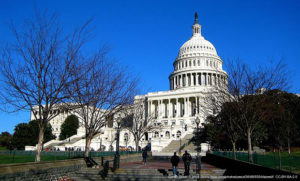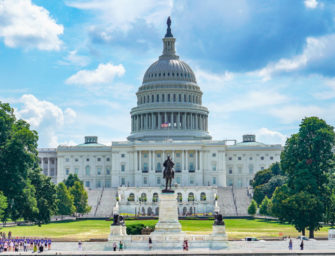ACTION NEEDED: Shutdown May Be Over, but Science Isn’t Secure Yet
 After passage by both the House and the Senate, President Trump has signed into law a bill to temporarily reopen the federal government until 15 February.
After passage by both the House and the Senate, President Trump has signed into law a bill to temporarily reopen the federal government until 15 February.
First, I am relieved to know this action means federal employees, including federal scientists, will receive their first paychecks in more than 30 days, and that they will receive the back pay they are owed. Unfortunately, the havoc this unprecedented shutdown has wreaked on their lives will not be so easily erased.
On a broader level, I’m also relieved that our nation’s federal scientists, and the contractors they work with, will be able to return to their important work. We jeopardize public health and safety, not to mention national security, when those dedicated individuals aren’t allowed to do their jobs. More than that the shutdown’s impact stretches even further when the researchers, labs and others outside of the federal government who regularly collaborate with our federal scientists or who rely on data from federal research facilities have their access blocked. And, when the shutdown cuts off federal grant funding, the impact isn’t as simple as a delay in beginning a new research project. It can range from leaving a student without funding to begin their next semester to putting equipment at risk because of delayed repairs to upending a research trip that cannot be rescheduled for twelve months due to weather conditions, and everything in between.
Despite my relief that we are now putting some of those things back in order, it is critically important to remember that this temporary re-opening is no solution for the challenges that our federal agencies and scientists face.
For one thing, we know that much of the scientific enterprise that has been disrupted over the last five weeks will not return to normal overnight. Some of the damage may be permanent. Moreover, with the incredible uncertainty of what will happen in three short weeks, programs and people will remain in a state of limbo.
Unfortunately, we are operating in an increasingly unpredictable and volatile political environment, and this uncertainty is nothing new. A little more than a year ago, when we experienced our second shutdown in five years, I wrote:
“Strong and predictable investment in America’s scientific enterprise remains one of the surest ways to encourage economic growth, increase the safety and security of our nation, and advance our understanding of the world around us. Conversely, without the contributions of scientific research, America would lose its role as global innovation leader, and our economy, national security, and the health and safety of our citizens would suffer.”
That’s why I am encouraging everyone to take two immediate steps that will help to influence what happens next
- Contact your members of Congress to encourage them to 1) secure a long-term funding bill for the rest of the year and 2) to avoid another shutdown.
- If the shutdown affected your work, tell them how and why that matters. Science doesn’t care which side of the aisle you’re on, it benefits everyone equally
- Share your shutdown story with AGU via email ([email protected]) or on AGU Connect
- How did the shutdown impact your science? Did that impact have an effect on others (e.g., communities that rely on your data)? If so, how? What was put at risk? AGU uses these stories in a number of ways, including with the media, policymakers and others, to demonstrate the importance of your science and inspire people to take action.
While we have a reprieve, however temporary it may be, there is no question that the shutdown took a toll on our science and those who rely on it, and that toll will reverberate for some time. I welcome your ideas, below, as well as on AGU Connect, about how AGU can support our community during this next phase of uncertainty.
Check out these additional stories about the government shutdown in Eos.org:
- Shutdown Hammers Early-Career Scientists (25 January)
- Furloughed Federal Workers Protest Extended Shutdown (24 January)
- Federal Government Shutdown Stings Scientists and Science (11 January)




The shutdown may have ended, at least for now, but the challenges facing U.S. federal science agencies and researchers still exist. Be a part of the solution and take action today!